|
Cincinnati Brewing History-After the Noble Experiment 1932-1986 |
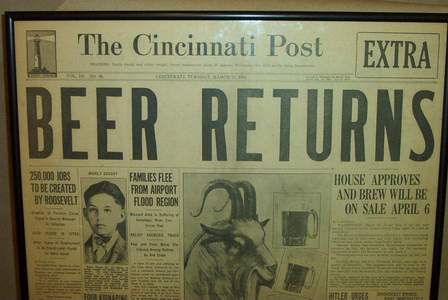 |
| 1932 Franklin Delano Roosevelt is elected president of the
United States with a plurality of 7,000,000 votes. A main plank in his
platform is a call to repeal prohibition. On March 22, 1933, Roosevelt signs the
Cullen/Harrison Act legalizing 3.2% beer on April 7, 1933. In November of 1933,
Utah becomes the 36th state to vote for the repeal of National
Prohibition.
|
1933
The following breweries opened in the year following the
repeal:
| The
Bruckmann Brewing Company was the only Cincinnati area brewery that continued to
make near beer so they were able to ship beer at 12:01 am on April 7, 1933 from
their location at Ludlow and the Canal. |
 |
The Old Munich Brewery begins operations the the
old Christian Moerlien facility at 2019 Elm Street. This Brewery operates until
1937.
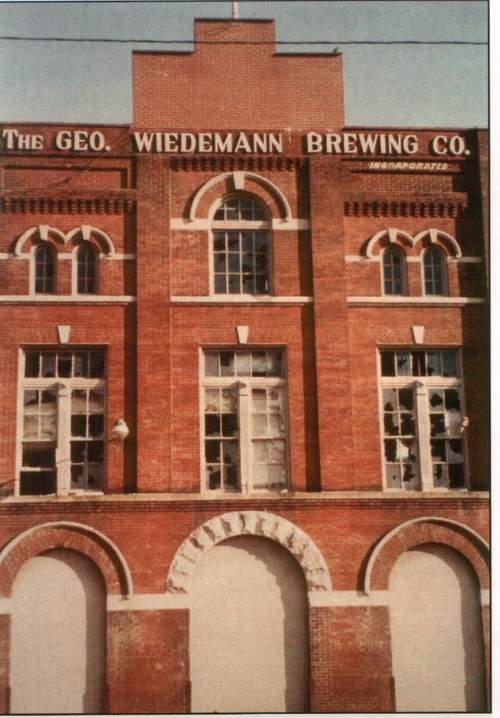 |
The
George Wiedemann Brewery reopens at 601
Columbia Street in Newport Kentucky. |
| The
Vienna Brewing Company, 312 Elliot Street and
322 Reading Road, occupies the former Gambrinus Stock Brewing Company site and
reopens in this year. By 1940, this brewery is bankrupt and out of business.
|
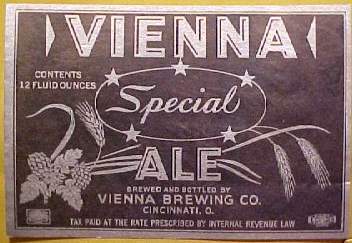 |
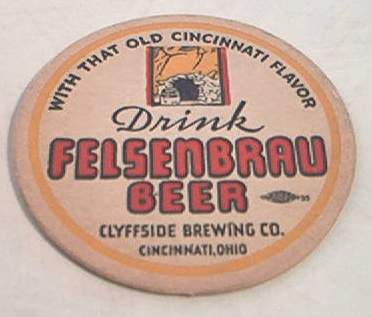 |
The Clyffside Brewing Company purchase the
buildings of the former Mohawk Brewing Company at 242 McMicken Avenue and begin
brewing. |
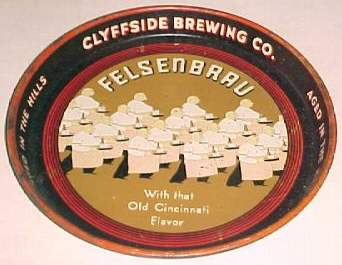 |
The Foss Schneider Company reopens at 943/1005
Freeman Avenue and operates until November 1937.
| Louis Ullman and Edgar Mack Jr. maintain a lease on the
brewing plant of the JOHN HAUCK BREWING CO. at 421 Dayton Street and 1747
Central
Avenue and open it as the Redtop Brewery. |
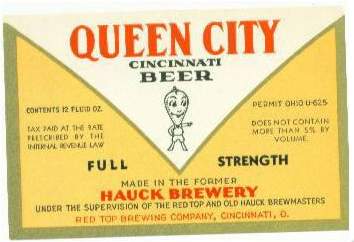 |
The Hudepohl Brewing Company reopens its brewery at
77/79 Clifton Avenue. This would later become Plant #1.
The JACKSON BREWING CO, at West McMicken and Elm, becomes the property of
the Squibb-Pattison Breweries, Inc.; however, they are unable to make the
brewery a viable enterprise and sell the operation to a group of Detroit, MI
investors in 1934.
.
The Schaller Brewing Co., despite its legal problems,
reopens at 1622/32 Main Street after the repeal of Prohibition and finally closes in 1941.
The Lion Brewery begins production after repeal and operates for one year
at Central Parkway and Liberty Street.
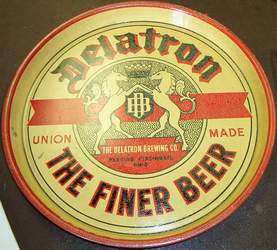 |
1934
George Delatron, one of the founders of the Vienna Brewery, opens the
Delatron Brewing Company located at the southeast corner of Reading and East
Amity (now East Galbraith) Roads. In 1946, Delatron relinquishes control of
the brewery and the new management group renames the brewery
The Cincinnati Brewing Company.
The Cincinnati Brewing Company closes it doors for good in 1951.
|
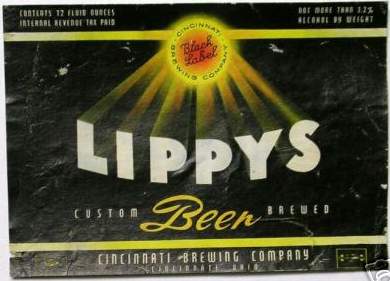 |
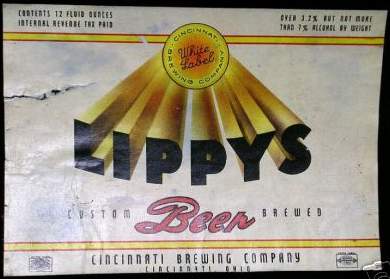 |
1934
The Schoenling Brewing & Malting Co., Inc. is
constructed on the site of the Schoenling Coal & Ice Company. This brewery
begins operations using The Schoenling Brewing & Ice Company
name.
|
1934
Burger Brewing Co. leases the old Lion Brewery at the corner
of Central Parkway and Liberty and begin brewing beer. This is a building with a
long history as it was built by the Windisch-Muhlhausers in 1860.
|
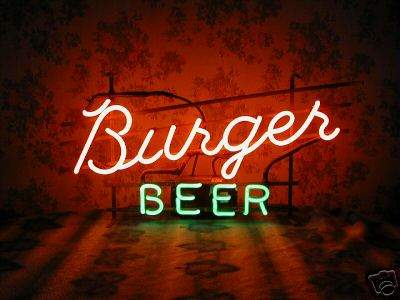 |
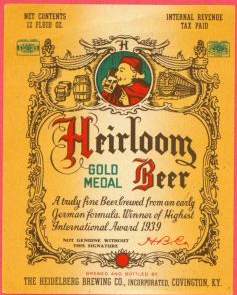 |
1934
The Heilelberg Brewing Co. opens on April 25, 1934 at 500/520 4th Street
at Philadelphia and Bakewell in Covington, KY.
|
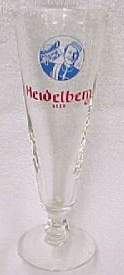 |
| 1934
Hudepohl Brewing Company purchases the Lackman Brewery on Fifth near
Baymiller and operate it as Plant #2.
|
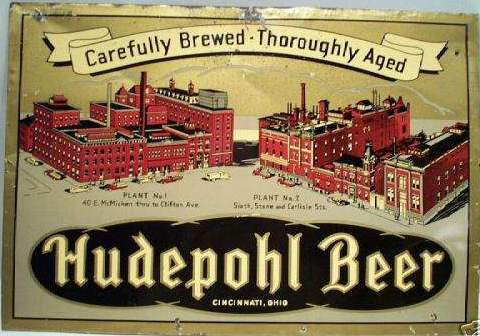 |
1934
Squibb/Pattison Beverages:aka Old Jackson Brewery located at 200/220 W. McMicken and Elm Street
reincorporates as the Jackson Brewing Co. and operate until 1942 when financial
problems force them to close.
1934
In order to meet post prohibition demand for product
Bruckmann Brewing purchases the Cincinnati Home Brewing location at 2960/2974
Spring Grove Ave. and operate it as Plant #2 until 1949.
1935
The Bavarian Brewery at 528 West 12th Street in
Covington, Kentucky reopens and operate until 1937 when William, Louis, and
Chris Schott purchase the brewery.
Burger Brewing takes on sponsorship of the Cincinnati Reds
radio broadcast on WKRC. Burger also sponsors a weekly music program called
"Burger Music Time". "Burger Music Time" featured a ever changing roster of
singers each accompanied by Ruth Lyons on either the piano or the organ.
1937
The Schoenling Brewing & Ice Co. change their name to the
Schoenling
Brewing Co.
1941
The first commercial television broadcast in Cincinnati
occurs when a Golden Gloves title bout is sponsored by Wiedemann Beer. This bout
airs on station W8XCT a week before it becomes WLWT.
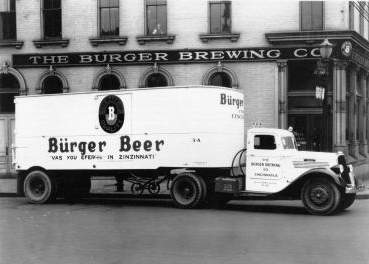 |
1943
Burger Brewing Company purchase the old Lion Brewery plant which they
had previously leased and continue to operate the brewery.
|
1945
Louis Ullman and Edgar Mack Jr. purchase the Clyffside Brewery at 242 McMicken
Ave. and Stonewall Street and start Plant #2 of the
Red Top Brewing Co.
The brewery becomes one of the largest in Ohio.
1949
The former Heidelberg Brewery in Covington is purchased by
Bavarian Brewery. This becomes Plant #2 and operates until 1955.
| 1949
The Herschel Condon Brewing Co. purchases the former Bruckmann Brewery.
This operation lasts for only one year.
|
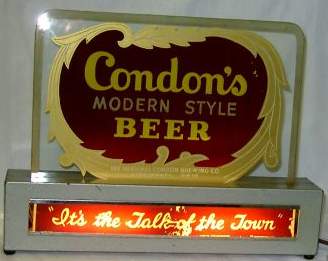 |
1953
Hudepohl Brewing Company consolidates all of its
brewing activity at the Fifth Street near Baymiller location.
1956
Burger Brewing Co. purchases the Burkhart Brewery
in Akron, OH and operate the plant until 1964 when it is closed.
1959
February- International Breweries Inc.
of Detroit, Michigan purchase The Bavarian Brewing Company in Covington.
International Breweries operate this brewery until 1966 when it closes.
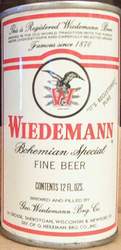 |
1967
The George Wiedemann Brewery is purchased by
G. Heileman Brewing Co. of
La Crosse, WI and operates as a Division of Heileman.
|
1973
March-The Burger Brewing Co. closes its
doors. Hudepohl Brewing Company purchases the brewery, acquire the rights
to their brands, and continue to produce the Burger line of beers.
1983
G. Heileman Brewing Co. closes the George Wiedemann brewery in Newport,
KY. The Wiedemann brands are moved to other G. Heileman facilities with most of
the Cincinnati area product being brewed at their Evansville, IN brewery.
| 1985
Hudepohl Brewing celebrates its 100th anniversary
with this special display in their lobby. |
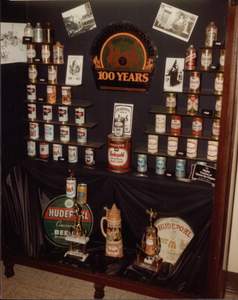 |
 |
|
1986
The Hudepohl Brewing Co. and the Schoenling Brewing Co. combine resources to
form the Hudepohl-Schoenling Brewing Co.
All production is planned for
the Central Parkway plant with the Gest Street facility being used as a
distribution center. After a year the Gest Street facility is closed and all
brewery operations are accomplished at the Central Parkway plant.
|
NEXT
RETURN
